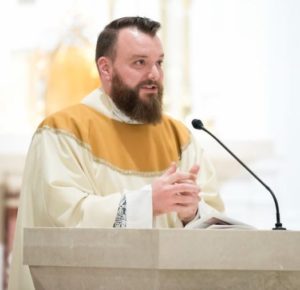 Dear Brothers and Sisters in Christ,
Dear Brothers and Sisters in Christ,
The radical simplicity of the mission Jesus gives to his disciples in the Gospel this weekend is powerful. They are sent out with the bare essentials for travel – a walking stick and sandals – and nothing else. To go and proclaim the Gospel requires no fancy equipment, no carefully crafted programs. Rather, our Lord gives the Apostles a share of his own divine authority over unclean, evil spirits, and they set out with his teachings on their lips to call those they meet away from sin and into a life of divine grace. This radically simple method of kerygma, of proclaiming the Gospel, continues today, and is especially carried out by mendicant communities such as the Franciscans. In recent years, we at St. Pius have benefited from the missionary work of the Franciscan Friars of the Renewal (www.franciscanfriars.com), who (pace their very nice website and media presence, made possible by generous donors and lay co-workers) carry out the greater part of their ministry on foot, among the poor, and with nothing more than the good news of Jesus Christ on their lips. We have also met the Little Sisters of the Lamb, who beg for their daily bread while sharing the gift of prayer and mercy with those they meet.
This Gospel passage and these mendicant communities are a strong reminder to us of what is most essential in the mission of the Church. Jesus never forbids the construction of buildings or the formation of programs and groups for the good of his people, but those things are never the most important. In fact, any building, any program, can only follow the fundamental kerygma, or proclamation of the Gospel. The Church then, is charged first with the apostolic mission. Given divine authority to teach and to heal, the Church is sent out to bring the message of Jesus to the entire world. This is the first and most important mission. From this evangelical mission flows the establishment of parishes, schools, and formation programs. With great wisdom the Church gives us this Gospel passage to reflect on so that we can remember our first and primary mission.
Of course, we will quickly recognize that we are not all Apostles. That is, we are not all called by God to carry out this mission in the same way. Jesus chose the Twelve from those who followed him and gave them a particular share of his authority. There were many others who also followed him who did not receive this exact mission. Nevertheless, all those who follow Jesus are given a share in this mission, though it will not always be expressed the same way. I would like to suggest two ways in which we can all be refreshed by the simplicity of this Gospel charge.
First, we can find consolation and confidence in the fact that Jesus does not predicate our mission on the resources we have available. In other words, to be a witness to Jesus’ love and mercy to others does not require one to have an advanced degree in theology, or unlimited funds, or the most up-to-date technology. All that is required is that we have met Jesus, encountered him especially in the Eucharist and in Confession, that we have heard the Gospel and want to help others hear that message. Every single baptized person can be a witness to the world.
Second, we can experience the simplicity of this message in a way that, at first glance, may not seem all that simple. We find the simplicity of the apostolic kerygma in the Church’s liturgy, especially the Mass. No matter where the Mass is celebrated, be it at the main altar of St. Peter’s Basilica, an ordinary parish church, or on a makeshift altar in a camp, hospital, or prison, the simple fact is that Jesus is made present and the truth of his mercy and love is proclaimed. The Mass does not depend on our abilities – whether there is music or not, competent preaching or not, etc. – Jesus still shows up. The Mass does not depend on our preferences, but rather takes us outside of ourselves, for the words of the Mass do not belong to a particular community or to an individual priest, but to the whole Church. In fact, the Mass helps us to remember that we carry out the evangelical Gospel mission not by our own authority, but only under the authority of Jesus Christ. The Mass is given to us, it is not something we create. When Jesus tells the apostles to go out and proclaim the good news, it is not something they must invent, but rather a gift they have received and now are to share. In the same way, we ought to see that the Mass is something given to us, something that remains simple even in its most ornate expressions, and that it is a gift for us to receive and share.
These two things – a personal encounter with Jesus and the liturgical/sacramental life of the Church – are the essentials. These are the walking stick and sandals of the Christian life. We are all called, in various ways, to the kerygmatic mission. As we go out to proclaim Jesus as Lord to the world, we need only take with us our walking stick and sandals, for our encounter with Jesus and the prayer we offer under his authority will be our support. So let us go out, taking nothing for the journey but those essentials, and proclaim repentance, mercy, and the presence and love of Jesus Christ.
Peace,

Fr. Sam


